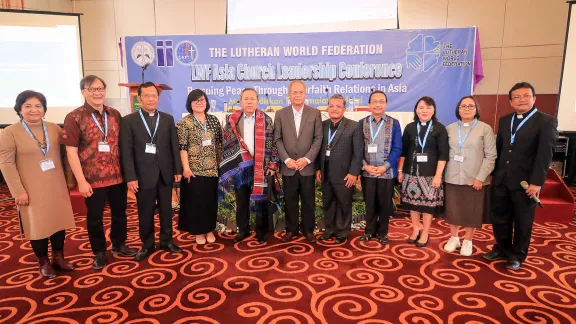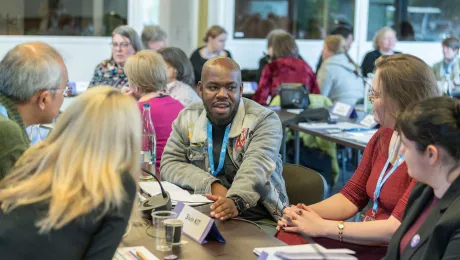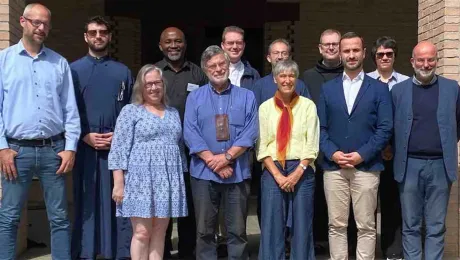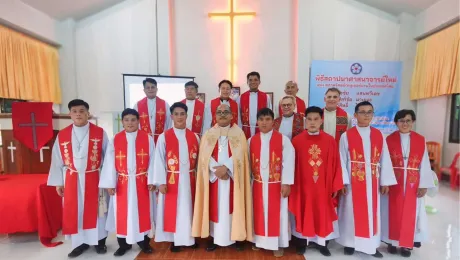
Indonesian church leaders meet with the President of the Republicâs special envoy on interfaith relations and intercultural dialogue, Professor Syafiq Mughni (center). Photo: LWF/Isaac Henry
Indonesia hosts conference on promoting dialogue at leadership and grassroots level
(LWI) - The Asia Church Leadership Conference (ACLC) has concluded in Indonesia with a call to all churches to work more closely together with other faith communities to promote urgent issues such as gender justice, environmental protection and care for the poor and needy.
Pastors and lay people from across the region have been meeting with local Lutheran leaders in the North Sumatra town of Pematang Siantar to discuss the theme ‘Pursuing peace through interfaith relations in Asia’. It was preceded by an encounter of Asian women leaders and a meeting of the Global Young Reformers Network, which focused on ways of ensuring more meaningful participation of young people in the life of the churches.
The five-day gathering was hosted by three of Indonesia’s member churches of the Lutheran World Federation (LWF), the Simalungun Protestant Christian Church (GKPS), the Christian Protestant Church in Indonesia (GKPI) and The Indonesian Christian Church (HKI).
Peace can never be taken for granted
On the final day, delegates heard from Indonesia’s special envoy for interfaith relations and intercultural dialogue, Professor Syafiq Mughni, about ways in which his country seeks to promote peaceful cooperation among followers of the six officially recognized faith groups. Local leaders from some of those groups attended the session that focused on the five principles, known as Pancasila, upon which the nation was founded following independence in 1945.
Noting the huge diversity of ethnicities, languages and religions in his country, Mughni stressed that “peace can never be taken for granted”. Since he took up the post last year, he has organized conferences to foster good relations between the different faiths and to promote “a culture of peace” in schools and universities. As a Muslim leader, he has also met with Islamic leaders around the world to promote ‘Wasatiyya’, a term meaning the ‘middle way’ or moderate Islam, as the nation’s majority religion.
LWF partnership with Islamic Relief Worldwide
Engaging in interfaith dialogue and cooperation was identified as a key point of the LWF’s strategic priorities for the coming years and is particularly relevant to the Asian context where Christians form just a small minority in most countries. From India, where growing Hindu nationalism has led to attacks on Christian and Muslim communities, to Myanmar, where hard line Buddhism has fed persecution of the Rohingya Muslim minority, to Malaysia where the ongoing Allah controversy continues to cause problems for Christian media, religious tensions are never far away from the news headlines.
The LWF “hopes that this kind of cooperation with other faith communities can help promote peace in the world.”
Highlighting the importance of interreligious cooperation as a way of increasing understanding between different faith communities, LWF Area Secretary for Asia, Rev. Dr Philip Lok noted that the LWF partners with Islamic Relief Worldwide and last year launched a manual on faith sensitivity in humanitarian responses to disasters and refugee crises. The guidelines, which were piloted in field work in Africa, Asia and the Middle East, cover medical, psychological and social issues, as well as practical aspects such as food, shelter and meeting places. Rev. Lok said the LWF “hopes that this kind of cooperation with other faith communities can help promote peace in the world.”
Dialogue at leadership and grassroots level
The Asia region of the LWF includes 55 member and associate member churches in 17 countries, from the Lutheran Church of Australia (LCA) in the South Pacific to The Evangelical Lutheran Church in Jordan and the Holy Land (ELCJHL). Delegates at the meeting heard about efforts of churches in many of those countries to promote dialogue at both leadership and grassroots level, despite many challenges stemming from the politicization of religion, as well as colonial histories and ongoing attempts at conversions by some Charismatic groups.
Speaking on the opening day of the conference, LWF General Secretary Rev. Dr Martin Junge praised the commitment of churches in Asia to peace building, despite the difficulties they face. “The task of peace-making,” he said, “begins within ourselves, within our own churches, seeking to live in peace with each other.”
Participants also heard about the current political unrest in Hong Kong and efforts by churches there to provide a space for rest, counselling and reconciliation within a deeply divided society. Hong Kong delegates noted how Protestant and Catholic churches are supporting each other in this work and they urged people around the world to continue to pray for peace in their country.


